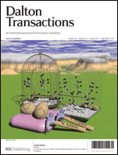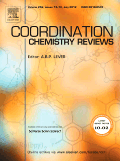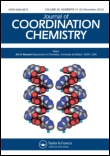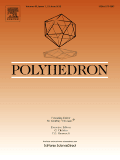
DALTON TRANSACTIONS
metrics 2024
Illuminating Pathways in Inorganic Chemistry
Introduction
DALTON TRANSACTIONS, published by the esteemed Royal Society of Chemistry, is a premier journal in the field of Inorganic Chemistry, recognized for its significant contributions to advancing research and scholarship since its inception in 2002. With an impressive Impact Factor and ranked in the Q1 category, it holds a notable position at Rank #21 out of 79 within its Scopus category, highlighting its reputation for excellence and influence in the scientific community. This journal provides a platform for disseminating high-quality research, reviews, and communications related to all aspects of inorganic chemistry, fostering collaboration and innovation among researchers, professionals, and students alike. Although it does not offer open access, its robust selection process and commitment to scholarly integrity ensure that published works are of the highest standard. For those passionate about inorganic chemistry, DALTON TRANSACTIONS serves as an essential resource, fostering a deeper understanding of the field and its applications.
Metrics 2024
 0.70
0.70 3.50
3.50 3.30
3.30 211
211Metrics History
Rank 2024
Scopus
IF (Web Of Science)
JCI (Web Of Science)
Quartile History
Similar Journals

Organics is a peer-reviewed journal dedicated to the advancement of research in the field of organic chemistry, published by MDPI, a renowned leader in open access publication. Since its inception in 2020, the journal has embraced an open access model, ensuring that cutting-edge research is freely available to researchers, professionals, and students worldwide. With a current impact factor reflecting its relevance in the community, Organics aims to provide a platform for high-quality research, reviews, and insights that foster innovation and collaboration in the organic chemistry domain. The journal's scope encompasses a broad range of topics within organic chemistry, making it an essential resource for those involved in various research endeavors. As it converges from 2020 to 2024, Organics is set to build on its solid foundation and enhance its scholarly contributions by attracting significant research contributions that align with the latest scientific developments. Based in Basel, Switzerland, the journal's commitment to quality and accessibility resonates strongly with today's research landscape, making it a pivotal asset for anyone invested in the future of organic chemistry.

CHINESE JOURNAL OF INORGANIC CHEMISTRY
Shaping the Future of Inorganic ScienceThe CHINESE JOURNAL OF INORGANIC CHEMISTRY, published by the esteemed CHINESE CHEMICAL SOC, stands as a pivotal resource for researchers and professionals in the field of inorganic chemistry. With an ISSN of 1001-4861, this journal has been disseminating cutting-edge research since its establishment in 1996 and continues to influence the scientific community with its commitment to high-quality publications. Although currently classified in the Q4 quartile for Inorganic Chemistry and ranked 70th out of 79 in its category according to Scopus, the journal serves as a platform for innovative studies that push the boundaries of inorganic materials and compounds. While it operates on a traditional access model, the journal is dedicated to fostering scientific discourse and collaboration among scholars in China and beyond, making it an essential reference for anyone involved in inorganic chemistry research.

ACS Organic & Inorganic Au
Catalyzing Discoveries in Open Access ChemistryACS Organic & Inorganic Au, published by the American Chemical Society, stands as a premier open-access journal dedicated to advancing the fields of organic and inorganic chemistry. Since its inception in 2021, this journal has swiftly risen to prominence, achieving a commendable Q1 classification in Inorganic Chemistry, Organic Chemistry, and Physical and Theoretical Chemistry as of 2023. With an ISSN of 2694-247X, it provides a vital platform for researchers, professionals, and students to disseminate their findings and engage with cutting-edge work across converged disciplines. Operating from its headquarters in Washington, DC, ACS Organic & Inorganic Au is committed to fostering a collaborative research environment, encouraging rigorous peer review, and ensuring the wide accessibility of high-quality scholarly articles. With its open-access model, readers worldwide can freely access and utilize research findings, promoting a global exchange of knowledge crucial for driving innovation in chemistry.

ACS Macro Letters
Pioneering Insights in Inorganic and Materials ChemistryACS Macro Letters, published by the American Chemical Society, is a leading journal in the fields of Inorganic Chemistry, Materials Chemistry, Organic Chemistry, and Polymers and Plastics. Established in 2012, this journal has swiftly ascended to the forefront of chemical research with an impressive reputation, as evidenced by its 2023 Scopus rankings placing it in the first quartile across multiple categories. The journal's objective is to disseminate timely and concise articles that advance the study of macromolecules and their applications, making it an essential resource for researchers, professionals, and students alike. With a focus on fostering innovation and facilitating collaboration within the chemical community, ACS Macro Letters presents a robust platform for scientists to share their groundbreaking findings. Being based in the United States, it serves as a central hub for global discourse in the chemical sciences, although it does not currently offer Open Access options. The journal's commitment to high-quality content is further underscored by its prestigious impact factor and acceptance into elite academic quartiles, signifying its influence and importance in shaping future research.

CHINESE JOURNAL OF STRUCTURAL CHEMISTRY
Shaping the Future of Structural InsightsThe CHINESE JOURNAL OF STRUCTURAL CHEMISTRY, published by Elsevier, stands as a vital resource in the field of structural chemistry, notably contributing to the advancement of knowledge since its inception in 1996. With its ISSN 0254-5861 and E-ISSN 0254-5861, the journal has established a firm reputation, garnering a Q2 ranking in the 2023 Chemistry (miscellaneous) category, which highlights its influence in the academic community (rank #155/408, 62nd percentile in Scopus). This journal serves as an invaluable platform for researchers and professionals by disseminating high-quality research findings, theoretical studies, and applied methodologies that address both fundamental aspects and emerging trends in structural chemistry. With contributions from distinguished scholars, it aims to foster innovation and collaboration, while providing a space for novel discoveries in the field. Although it does not currently offer Open Access, its robust content continues to attract a diverse readership eager to engage with cutting-edge scientific developments.

COORDINATION CHEMISTRY REVIEWS
Connecting Concepts in Coordination ChemistryCOORDINATION CHEMISTRY REVIEWS is a premier academic journal published by ELSEVIER SCIENCE SA, specializing in the interdisciplinary field of coordination chemistry. Established in 1966 and running until 2025, the journal boasts an impressive reputation, having achieved Q1 quartile rankings in categories such as Inorganic Chemistry, Materials Chemistry, and Physical and Theoretical Chemistry. It holds a remarkable position in Scopus rankings, being ranked #1 in both Physical and Theoretical Chemistry and Inorganic Chemistry, indicating its significance within the field. With a focus on comprehensive reviews that synthesize existing knowledge and propose future research directions, COORDINATION CHEMISTRY REVIEWS serves as an invaluable resource for researchers, professionals, and students eager to stay at the forefront of coordination chemistry advancements. Although not open access, the journal is accessible through various academic institutions and libraries, ensuring that cutting-edge research is available to those who seek it.

Inorganics
Pioneering Open Access in Inorganic ChemistryInorganics is a vibrant, peer-reviewed Open Access journal dedicated to advancing the field of inorganic chemistry, published by MDPI since 2013. Based in Switzerland, this journal aims to provide a dynamic platform for researchers, professionals, and students to share groundbreaking findings, fostering collaboration and innovation within the global scientific community. With an impressive Q2 ranking in the category of Inorganic Chemistry as of 2023, Inorganics stands out as a significant conduit for high-quality research that spans a wide range of topics from coordination compounds to metal-organic frameworks. Its commitment to accessibility ensures that cutting-edge research can be accessed, utilized, and built upon by a diverse audience, thereby amplifying its impact. Join the conversation in Inorganics and contribute to the ever-evolving landscape of inorganic chemical research.

JOURNAL OF COORDINATION CHEMISTRY
Unveiling Innovations in Metal Coordination ResearchJOURNAL OF COORDINATION CHEMISTRY is a prestigious academic journal published by Taylor & Francis Ltd, focusing on the vital intersection of materials chemistry and physical and theoretical chemistry. Since its inception in 1971, the journal has provided a platform for disseminating high-quality research that explores the coordination chemistry of metals and its implications in various scientific domains. With an ISSN of 0095-8972 and an E-ISSN of 1029-0389, this journal serves a diverse community of researchers and professionals dedicated to advancing their understanding of coordination compounds and their applications. The journal's current rankings place it in the Q3 category for both Materials Chemistry and Physical and Theoretical Chemistry, with Scopus rankings highlighting its relevance and contribution to these fields. The absence of open access underscores the journal's commitment to maintaining rigorous academic standards while ensuring a broad reach through reputable publication practices. As it converges toward 2024, JOURNAL OF COORDINATION CHEMISTRY invites contributions that push the boundaries of knowledge and foster innovative research in multiple contextual applications.

POLYHEDRON
Bridging Theory and Practice in Chemical Research.POLYHEDRON is a prestigious academic journal published by Pergamon-Elsevier Science Ltd, specializing in the fields of Inorganic Chemistry, Materials Chemistry, and Physical and Theoretical Chemistry. With its ISSN 0277-5387 and E-ISSN 1873-3719, the journal has been a significant outlet for groundbreaking research since its inception in 1982 and continues to be influential for scholars and practitioners. As of 2023, it holds a Q3 quartile ranking across its categorization, underscoring its impact within the scientific community with respectable Scopus Rankings that place it in the top percentiles of relevant fields. Situated in the United Kingdom, POLYHEDRON aims to foster the exchange of innovative ideas and findings related to polyhedral molecules and structures, making it an essential resource for researchers seeking to expand their knowledge and contribute to these dynamic areas of study. While currently not an Open Access journal, it remains committed to advancing education and research by providing quality content that serves both academic and practical applications.

BIOINORGANIC CHEMISTRY AND APPLICATIONS
Bridging chemistry and biology for a sustainable future.BIOINORGANIC CHEMISTRY AND APPLICATIONS, published by HINDAWI LTD, is a distinguished journal dedicated to advancing the field of bioinorganic chemistry, offering an open access platform since 2008. With an ISSN of 1565-3633 and E-ISSN of 1687-479X, this journal provides a global forum for researchers, practitioners, and scholars in the vibrant fields of Biochemistry, Inorganic Chemistry, and Organic Chemistry. Recognized for its scholarly impact, it holds an impressive Q2 rank in Biochemistry and Q1 ranks in both Inorganic and Organic Chemistry in the 2023 metrics. Catering to a diverse audience, the journal emphasizes the importance of interdisciplinary research and the application of inorganic chemistry in biological systems. With an accessible range of articles aimed at fostering scientific dialogue and innovation, BIOINORGANIC CHEMISTRY AND APPLICATIONS plays a crucial role in shaping future research and application in the chemical sciences.